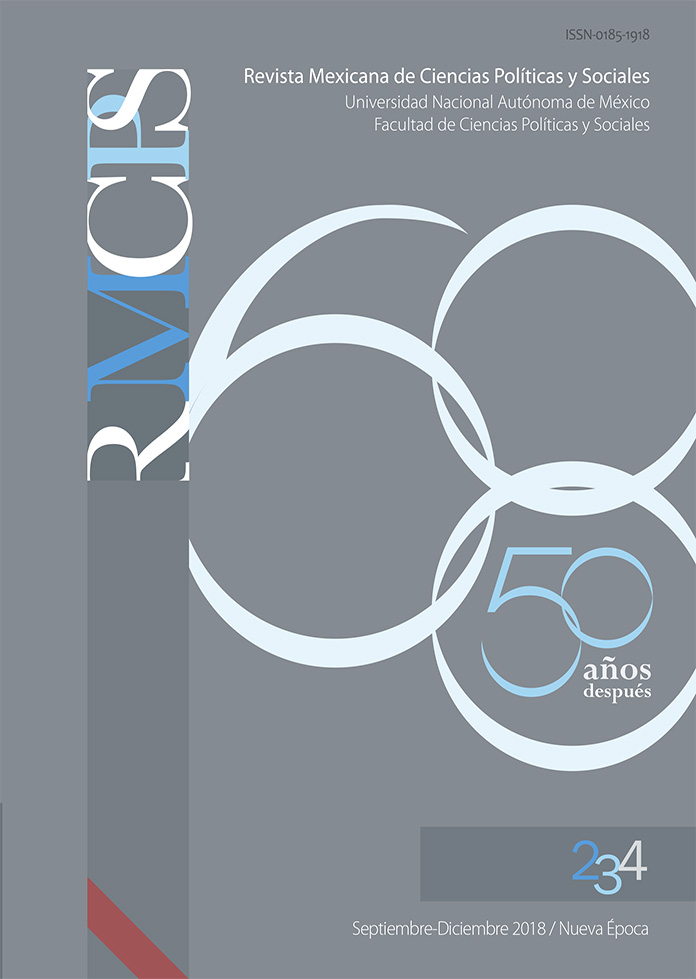The Sixties and Me: From Cultural Revolution to Cultural Theory
Contenido principal del artículo
Resumen
[Los años sesenta y yo: de la revolución cultural a la teoría cultural]
ABSTRACT
In this article, the author offers an approach to his personal and academic development during the 1960s and how they laid the foundations for his contributions in the field of sociology. Pointing out those years as a moment in which a tumultuous social conscience, strongly influenced by the New Left, broke with the static rationalization of modernity, the author analyzes his radicalization in Marxism during his student years at Harvard and his eventual distancing from it. He also explores how the Vietman war and specific events of the time shaped an entire generation, through pointing to the possible existence of alternative social orders.
RESUMEN
En este artículo el autor ofrece un acercamiento a lo que fue su formación personal y académica durante la década de 1960 y cómo ellas sentaron las bases para sus contribuciones en el ámbito de la sociología. Señalando esos años como un momento en el que una tumultuosa conciencia social, fuertemente influida por la Nueva Izquierda, rompió con la racionalización estática de la modernidad, el autor analiza su radicalización en el marxismo durante su estancia en Harvard y su eventual distanciamiento del mismo. Asimismo, relata cómo la guerra de Vietnam y ciertos eventos específicos de la época moldearon a toda una generación, a través de apuntar hacia la posible existencia de órdenes sociales alternativos.
Descargas
Detalles del artículo
Citas en Dimensions Service
Citas
Alexander, Jeffrey C. (1982-1983) Theoretical Logic in Sociology (4 vols.). Berkeley: University of California Press.
Alexander, Jeffrey C. (2012) Trauma: A Social Theory. Cambridge, UK: Polity.
Alexander, Jeffrey C. (2013) The Dark Side of Modernity. Cambridge, UK: Polity Press.
Alexander, Jeffrey C.; Eyerman, Ron; Giesen, Bernhard; Smelser, Neil J. and Piotr Stzompka (2004) Cultural Trauma and Collective Identity. California: University of California Press.
Anderson, Perry (1976) Western Marxism. London: Verso.
Avineri, Shlomo (1969) The Social and Political Thought of Karl Marx. Cambridge: Cambridge University Press.
Brown, Norman O. (1966) Love’s Body. New York: Random House.
Campbell, Colin (1987) The Romantic Ethic and the Spirit of Consumption. Oxford: Blackwell.
Campbell, Colin (2006) “All you need is love”: From Romance to Romanticism: The Beatles, romantic love and cultural change” Etnofoor, XIX (1): 111-123.
Cockburn, Alexander and Robin Blackburn (eds.) (1969) Student Power: Problems, Diagnosis, Action. London: Penguin.
Danesi, Marcel (forthcoming) Popular Culture: Introductory Perspectives [4th ed.]. New York: Rowman and Littlefield.
Dickstein, Morris (1977) Gates of Eden: American Culture in the Sixties. New York: Basic Books.
Gorz, André (1967) Strategy for Labor. A Radical Proposal. New York: Beacon Press.
Gramsci, Antonio (1971) Selection from The Prison Notebooks. New York: International Publishers.
Hayes, Harold (ed.) (1969) Smiling through the Apocalypse: Esquire’s History of the Sixties. New York: McCall.
Hughes, H. Stuart (1958) Consciousness and Society. New York: Random House.
Lichtman, Richard (1982) The Production of Desire: The Integration of Psychoanalysis into Marxist Theory. New York: Free Press.
Lukács, Georg (1971)[1924] History and Class Consciousness. Cambridge: MIT Press.
Marcuse, Herbert (1955) Eros and Civilization: A Philosophical Inquiry into Freud. New York: Vintage.
Marcuse, Herbert (1964) One Dimensional Man. Boston: Beacon.
Mills, C. Wright (1959) The Sociological Imagination. New York: Oxford University Press.
New Left Review (ed.) (1977) Western Marxism: A Critical Reader. London: New Left Review Editions.
Poster, Mark (1975) Existential Marxism in Postwar France: From Sartre to Althusser. Princeton: Princeton University Press.
Sartre, Jean-Paul (1963) Search for a Method. New York: Harper Torchback.
Sica, Alan and Stephen Turner (eds.) (2005) The Disobedient Generation. Social Theorists in the Sixties. Chicago: University of Chicago Press.
Sklar, Martin J. (1969) “On the proletarian revolution and the end of political-economic society” Radical America: An SDS Journal of American Radicalism, 3(3): 1-41.
Turner, Victor (1995) The Ritual Process: Structure and Anti-Structure. New York: Aldine de Gruyter.
Walzer, Michael (1970) Obligation: Essays on Disobedience, War, and Citizenship. Cambridge: Harvard University Press.
Wellmer, Albrecht (1971) Critical Theory of Society. New York: Herder and Herder.

La Revista Mexicana de Ciencias Políticas y Sociales publicada por la Universidad Nacional Autónoma de México se distribuye bajo una Licencia Creative Commons Atribución-NoComercial-SinDerivar 4.0 Internacional.
Basada en una obra en http://www.revistas.unam.mx/index.php/rmcpys/
La RMCPyS autoriza a sus colaboradores que suban una copia de sus trabajos publicados en sus webs personales o en cualquier repositorio de acceso abierto, siempre y cuando se mencione específicamente a la Revista Mexicana de Ciencias Políticas y Sociales como fuente original de procedencia, citando el año y número del ejemplar respectivo y añadiendo el enlace a la página web donde este órgano editorial puede ser consultado in toto, de manera abierta y gratuita en: <www.revistas.unam.mx/index.php/rmcpys>.
Las y los lectores tienen libertad para:
Compartir, copiar y redistribuir el material en cualquier medio o formato.
El licenciante no puede revocar estas libertades en tanto usted siga los términos de la licencia.
De acuerdo con los siguientes términos:
- Atribución: la/el lector/a debe reconocer el crédito de una obra de manera adecuada, proporcionar un enlace a la licencia, e indicar si se han realizado cambios. Puede hacerlo en cualquier forma razonable, pero no de forma tal que sugiera que tiene el apoyo del licenciante o lo recibe por el uso que hace.
- No comercial: la/el lector/a no puede hacer uso del material con fines comerciales.
- Si se mezcla, transforma o se desarrolla a partir de la obra licenciada, no se permite la distribución del material modificado.
Cargos por gestión de artículos
La Revista Mexicana de Ciencias Políticas y Sociales NO cobra tarifas por recibir, procesar o publicar los artículos (Article Processing Charge [APC]) enviados por los autores.





